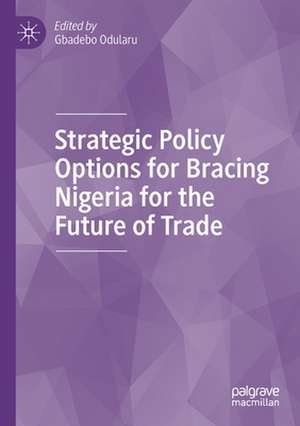Strategic Policy Options for Bracing Nigeria for the Future of Trade
Editat de Gbadebo Odularuen Limba Engleză Paperback – 29 ian 2021
This book analyzes the importance of STI’s contributions to the Nigerian economy, focusing on the transition to digital solutions and their potential to significantly increase trade and commerce. Since AfCFTA’s 2018 launch, academic and political responses to the automation of business have increased. Further, business promotion, aid-for-trade, regional integration and trade facilitation issues are at the forefront of business development policy and intellectual discourse in Nigeria. This book details Nigeria’s business opportunities, capacities and challenges with a special interest in sustainably enhancing the nation’s business ecosystem in the digital age. Through the examination of trade facilitation policies, programs, tools, models and technologies, this book demonstrates Nigeria’s need for strategic public-private partnership in digital trade to foster a more sustainable business future.
| Toate formatele și edițiile | Preț | Express |
|---|---|---|
| Paperback (1) | 384.70 lei 43-57 zile | |
| Springer International Publishing – 29 ian 2021 | 384.70 lei 43-57 zile | |
| Hardback (1) | 389.70 lei 43-57 zile | |
| Springer International Publishing – 29 ian 2020 | 389.70 lei 43-57 zile |
Preț: 384.70 lei
Nou
Puncte Express: 577
Preț estimativ în valută:
73.61€ • 77.06$ • 60.91£
73.61€ • 77.06$ • 60.91£
Carte tipărită la comandă
Livrare economică 07-21 aprilie
Preluare comenzi: 021 569.72.76
Specificații
ISBN-13: 9783030345549
ISBN-10: 3030345548
Pagini: 231
Ilustrații: XVII, 231 p. 25 illus., 20 illus. in color.
Dimensiuni: 148 x 210 mm
Greutate: 0.34 kg
Ediția:1st ed. 2020
Editura: Springer International Publishing
Colecția Palgrave Macmillan
Locul publicării:Cham, Switzerland
ISBN-10: 3030345548
Pagini: 231
Ilustrații: XVII, 231 p. 25 illus., 20 illus. in color.
Dimensiuni: 148 x 210 mm
Greutate: 0.34 kg
Ediția:1st ed. 2020
Editura: Springer International Publishing
Colecția Palgrave Macmillan
Locul publicării:Cham, Switzerland
Cuprins
1. The Primer: Bracing Nigerian Trading Ecosystem for the Future.- 2. Preparing Nigeria for Digital Trade within the WTO E-Commerce Negotiations: Issues and Policy Directions.- 3. Trade Facilitation and Logistics Performance in Saudi Arabia: Lessons and Policy Directions for Nigeria in the Digital Age.- 4. Understanding the Role of Selected Measures in Facilitating Trade under Nigeria’s WTO Obligations: Lessons and Policy Agenda for Selection Sectors – Oil and Gas, Fish and Foreign Exchange.- 5. Innovative Strategies for Maximizing Aid-for-Trade towards Enhancing Transport Infrastructure and Intra-Regional Trade Facilitation: Policy Directions for Nigeria and West Africa.- 6. Harnessing AfCFTA for Economic Diversification in Nigeria: The Role of Trade Logistics and Infrastructure.- 7. Sequencing and Negotiating Nigeria's Regional and International Trade Agreements in the Digital Age: Issues and Policy Recommendations.- 8. Conclusion and Policy Recommendations.
Notă biografică
Gbadebo Odularu teaches Economics and Finance at Bay Atlantic University, Washington DC. He is the Senior Technical Consultant at Socio-Economic Research Applications & Projects, Washington, DC, USA. He is also affiliated with the Center for Research on Political Economy (CREPOL), School of Business and Technology, Marymount University, as well as the American Heritage University of Southern California (AHUSC), USA. He works closely with national, continental and international partners to provide evidence-based policy tools for fostering digital economy towards realizing the United Nations Sustainable Development Goals (UN SDGs) 2030. His most recent book is Trade Facilitation Capacity Needs (Palgrave Macmillan, 2019).
Textul de pe ultima copertă
As the fourth industrial era evolves, the role of blockchain technology, Artificial Intelligence (AI), and machine learning in transforming national commerce cannot be overemphasized, especially with the expansion of e-commerce in Africa. In other words, technological advancement and innovation are becoming essential to many aspects of Nigerian businesses, thereby considerably enhancing trade and productivity. This book provides a primer on the role that digital technology may play in Nigeria’s trade flows, and the implications for enabling an economy-wide deployment of digitization in trade facilitation.This book analyzes the importance of STI’s contributions to the Nigerian economy, focusing on the transition to digital solutions and their potential to significantly increase trade and commerce. Since AfCFTA’s 2018 launch, academic and political responses to the automation of business have increased. Further, business promotion, aid-for-trade, regional integration and trade facilitation issues are at the forefront of business development policy and intellectual discourse in Nigeria. This book details Nigeria’s business opportunities, capacities and challenges with a special interest in sustainably enhancing the nation’s business ecosystem in the digital age. Through the examination of trade facilitation policies, programs, tools, models and technologies, this book demonstrates Nigeria’s need for strategic public-private partnership in digital trade to foster a more sustainable business future.
Caracteristici
Provides a primer on the role that digitalization may play in fostering Nigeria's trade flows and trajectory Takes a special look at how to sustainably enhance Nigeria's business ecosystem in the digital age Makes the argument that technological advancements such as AI and blockchain will improve trade capacities and expansion in Nigeria
